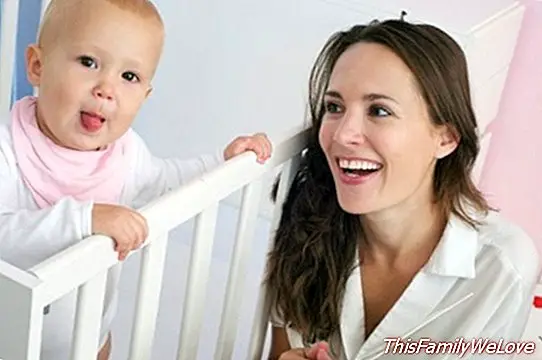Stages of baby language

The acquisition of language It is a process of cognitive and emotional development that makes us unique as a species and that begins from birth to two years of age. During this period of time, the language of the baby goes through different stages in which it is necessary to advance. To overcome them, babies depend to a large extent on the stimuli they receive.
Parents are the people who most intervene in the evolution of the baby's language. The stimuli that your parents offer in response to the first babbling, the response you receive from others ... will feed the baby's desire to connect with others.
The stages of language acquisition
The baby's language stages are five and closely related to his age, since the baby's cognitive development is closely related to the progress in language acquisition. However, motivation and stimulation are essential for the baby to acquire the ability to communicate.
1. Discovery stage. From 0 to 8 months
- The understanding of the baby. Since the baby is born, he is receptive to the tone of his parents' voice, he understands simple gestures and as he grows he recognizes sounds with which he will anticipate what will happen in his daily routine. He also recognizes voices, faces, objects, identifies the tone of voice, but does not understand the words.
- The expression of the baby: Crying is your first and only form of expression during your first months of life. Later, he will be able to smile and return the smile and to emit vocalizations and babbles with which he will express his state of mind. He will discover his hands and arms to gesture and will be able to change the volume and tone of his voice.
2. Communication stage. From 8 to 13 months
- The understanding of the baby. It begins with the language that is repeated over and over again during the daily routines that are repeated as food, bathing, play ... In this way, the baby understands the words by associating them with acts and objects. Just after that, the first babbles begin to appear that try to imitate the words he understands.
- The expression of the baby. From 9 months, and coinciding with a cortical maturation and the fact of having established a trust with the adult, the baby displays its communicative intentionality. In this phase, the baby is not yet able to express some "understandable" word, but adults who are in contact with him can understand the idea in his head. He follows triangulations of joint attention, salutes, says goodbye, protests, waves his hands ... and uses babbles and vocalizations.
3. Stage of words-phrase. From 12 to 18 months
- The understanding of the baby. There is an increase in the words that comprise, and at the same time, it includes simple orders related to everyday situations and daily habits.
- The expression of the baby. From his first birthday, the baby will pronounce his first word. This moment is very special and the mission of the parents is to motivate them to try again and again, even if their first words are not complete or they are not pronounced completely. It is also possible that you use the same word to express several things.
4. Stage of combination of two words. From 18 to 24 months
- The understanding of the baby. His comprehension of the vocabulary is increasingly wide and it is noticeable when trying to unite words of two in two.
- The expression of the baby. It stands out for the combination of two words, which together without links, that is, without articles, prepositions or verbs. So start talking. Even his expression of language lacks a grammatical structure. Mom house can serve to express many meanings as I want to go home with mom, mom is home ...
5. Stage of simple sentences. From 24 to 36 months
- The understanding of the baby. At this point, you could say that he already understands everything or almost everything.
- The expression of the baby. The unions of words give way to simple sentences, increasingly complex, which are completed with elements and links. Little by little, these simple sentences will be increasingly complex, allowing the baby to take a big step in language acquisition: hold increasingly longer conversations.
Marisol Nuevo Espin




